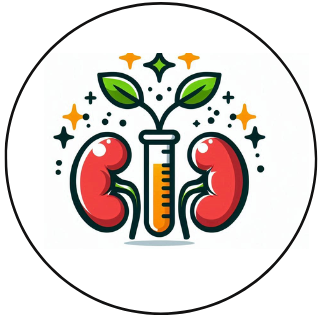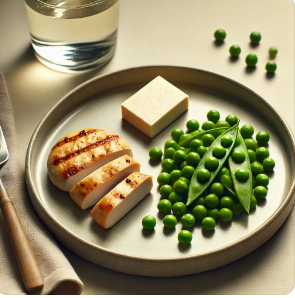Understanding the Role of Protein in Kidney Disease: Best Sources, Risks, and Diet Tips for Healthy Kidneys
For people with kidney disease, managing protein intake is essential. While protein is an important nutrient that supports muscle growth, immune function, and overall health, high levels of protein can strain the kidneys. To optimize kidney health, it’s crucial to choose the right types of protein and consume them in amounts that support rather than harm kidney function. In this post, we’ll look at how protein impacts the kidneys, types of protein to consider, and diet tips for including protein in a kidney-friendly way.
How Does Protein Affect Kidney Function?
The kidneys are responsible for filtering waste and excess fluids from the blood, a process that becomes more challenging when protein levels are high. Excess protein can lead to more waste products, which forces the kidneys to work harder, potentially accelerating kidney damage. However, the type and amount of protein matter greatly, as some proteins are less taxing on the kidneys.
For those with chronic kidney disease (CKD), a balanced approach to protein intake can help reduce kidney strain and support better health outcomes. Always consult with a healthcare provider or dietitian before making major changes to your protein intake, especially if you have kidney disease.
Types of Protein and Their Effects on Kidney Health
1. High-Quality Animal Proteins
Examples: Chicken, fish, eggs, lean red meat (in moderation)
Animal proteins are considered high-quality because they contain all essential amino acids. However, these proteins create more nitrogenous waste during digestion, which can add stress on the kidneys. For individuals with advanced kidney disease, it’s often recommended to limit red meats and focus on lean options like poultry, fish, or egg whites, which are easier on the kidneys.
Best Choices for Kidney Health:
- Egg Whites: High in protein and low in phosphorus, making them ideal for those with kidney issues.
- Chicken Breast (skinless): Provides lean protein with lower fat content.
- Fish: Salmon and other fatty fish are rich in omega-3 fatty acids, which support heart and kidney health.
If fresh fish is not always accessible or is not within your budget, try a high-quality fish oil supplement like Viva Naturals triple strength Omega-3 fish oil as an option for omega-3 intake
2. Plant-Based Proteins
Examples: Beans, lentils, tofu, quinoa, nuts, seeds
Plant-based proteins generally produce less waste than animal proteins, making them kidney-friendly choices. Although some plant proteins are high in potassium and phosphorus (which may need to be managed in later stages of CKD), they offer fiber and beneficial compounds that support overall health. Tofu, lentils, and quinoa are particularly good options for those with kidney disease.
Best Choices for Kidney Health:
- Tofu: Low in potassium and phosphorus, making it a suitable meat alternative.
- Lentils: Rich in protein and fiber, though intake should be moderated based on kidney health stage.
- Quinoa: A complete protein with all essential amino acids, great for a plant-based kidney diet.
If plant-based proteins are hard to wrap you head around, consider this plant-based protein cookbook to make preparing plant protein meals easier and more enjoyable.
3. Dairy Proteins
Examples: Milk, yogurt, cheese
Dairy products contain high-quality protein but are also high in phosphorus and potassium, which can be problematic for those with kidney disease. For early-stage CKD, dairy can be included in moderation, but it is often limited in later stages.
Best Choices for Kidney Health:
- Low-Phosphorus Dairy Options: Skim milk or milk substitutes with low phosphorus and potassium (like almond milk).
- Low-Sodium Cottage Cheese: A small amount can provide protein without excessive sodium or phosphorus.
Low-phosphorus milk substitutes, such as these in this link can help with limiting your phosphorus intake. If you want the dairy option, try a set of portion control cups to keep your phosphorus levels at a healthy level.
4. Processed and Red Meats
Examples: Sausages, bacon, ham, beef, lamb
Processed meats are high in sodium, phosphorus additives, and saturated fats, all of which strain the kidneys. Red meats, while protein-rich, are harder for the kidneys to filter, making them better in small amounts or avoided altogether.
Best Choices for Kidney Health:
- Limit Processed Meats: Opt for unprocessed, fresh proteins whenever possible.
- Moderate Red Meat Intake: If including red meat, select lean cuts like sirloin and keep portions small.
This lean meat cookbook can help you focus on healthy, kidney-friendly recipes if you ‘re interested in managing portion sizes while eating well.
How Much Protein Should You Eat for Kidney Health?
Protein needs vary depending on the stage of kidney disease and individual health needs. For those with early-stage CKD, a moderate intake of protein (0.6-0.8 grams of protein per kilogram of body weight per day) is often recommended. Individuals with end-stage kidney disease may need to limit protein intake even further to reduce strain on the kidneys.
Tips for Including Protein in a Kidney-Friendly Diet
- Control Portions: Aim for 2-3 ounces of lean protein per meal, roughly the size of a deck of cards. Using a kitchen scale or measuring cups can help with portion control.
- Use Low-Sodium Seasonings: Herbs, spices, and sodium-free seasonings can make your protein dishes flavorful without adding kidney-stressing sodium.
- Mix Animal and Plant Proteins: A balanced mix can help you avoid excess animal protein while still meeting your needs. Try pairing small amounts of lean meats with kidney-friendly plant proteins like quinoa or tofu.
- Plan Protein Around Other Nutrients: Since protein is only one component of a kidney-friendly diet, consider how it fits with your potassium and phosphorus goals. For example, pair proteins with lower-potassium vegetables like green beans, cauliflower, or bell peppers.
- Cook Creatively: Try grilling, baking, or steaming proteins instead of frying them to reduce added fats and keep meals kidney-friendly.
You might try this recommended grill pan for healthier cooking, eliminating or reducing the need for extra oils.
Wrap-Up
For those managing kidney disease, being mindful of protein intake is a key part of dietary management. By choosing the right types of protein, balancing animal and plant sources, and watching portions, you can enjoy a satisfying, kidney-friendly diet. Remember to consult with a healthcare provider or dietitian before making significant changes to your diet, especially if you have advanced kidney disease.
Meta Tag for SEO:
htmlCopy code
Replace "Your Name or Business Name", the article URL, and the image URL with your actual information.
Incorporating these tips on protein can make a big difference in kidney health management, and including affiliate products like low-sodium seasonings, protein cookbooks, and portioning tools can add value for readers while providing a supportive income stream.
4o

